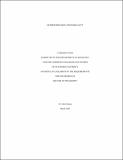Gender Mistakes and Inequality
Author(s)
Bourg, Chris
Downloadgendermistakes small.pdf (398.8Kb)
Terms of use
Metadata
Show full item recordAbstract
In nearly every interaction, we sex categorize one another. This simple, unconscious, and ubiquitous act of categorizing someone as male or female has been shown to contribute to the creation and conservation of a variety of kinds of gender inequality. This dissertation examines the impact of gender mistakes – situations where an actor becomes aware that someone they assumed was male is female (or vice-versa) – on the behaviors and attitudes of the person who made the mistake. Results of this experimental research indicate that individuals who have mistakenly classified someone as the “wrong” sex, and interacted with that person on the basis of that mistake before learning of their mistake, are less likely to use sex as a basis for categorization in a subsequent situation. These results indicate that gender mistakes could contribute to a reduction in gender inequality through decreased individual reliance on sex categorization by those who have experienced a situation where they became aware of having sex categorized someone incorrectly.
Date issued
2003-03Keywords
gender, social psychology